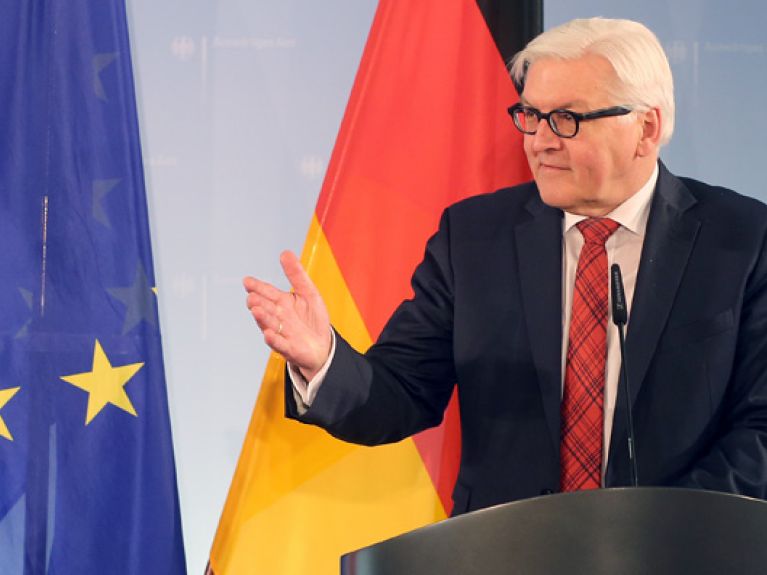“In these difficult times we are very consciously assuming more responsibility for Europe”
In an interview, Federal Foreign Minister Frank-Walter Steinmeier speaks about the opportunities of the OSCE, the situation in Ukraine and dealing with the refugee crisis.

Foreign Minister, Germany holds the Chairmanship of the OSCE in 2016. Where will you be placing special emphasis in the course of this year?
We are facing perhaps the most serious threat to peace and security in Europe since the end of the Cold War. In these difficult times we are very consciously assuming the Chairmanship and with it more responsibility for Europe. The guiding principle of our OSCE Chairmanship is “Renewing dialogue, rebuilding trust, restoring security” – and that is also what we shall be working for. A great deal of the trust in Europe has been lost in recent years. Rebuilding this will be difficult – but there is no alternative! I would like us to be able to say to future generations that we did everything to preserve peace on our continent.
The conflict in Ukraine has lasted over two years now. What role can the OSCE play there in the future? Is an expansion of the Special Monitoring Mission (SMM) planned?
Developments in Ukraine since 2014 have shown how indispensable the OSCE is for security in Europe. The Trilateral Contact Group facilitated the creation of a joint framework for overcoming the conflict and its different aspects under the auspices of the OSCE. And without the SMM we would probably not have progressed as far as we have on military de-escalation and the withdrawal of weapons – despite all the setbacks. It was important that we were able to extend the mission mandate for another year until the end of 2017 and agree a new budget of just under 100 million euros for the mission so that the observers can continue to carry out their important work. The existing mandate has proved successful. It gave the mission all the freedom of manoeuvre it required to fulfil its duties. The observers have been able to respond flexibly not only to developments on the spot, but also to new requirements. It is still important, however, that the observers finally receive unrestricted access to the entire conflict area.
How can the OSCE promote peace and security in Europe? What are the advantages of an organisation like the OSCE compared to other international bodies?
The CSCE process taught us an important lesson: especially at times of deep distrust and growing speechlessness between East and West, we must not let dialogue between the participating states break down. The fact that the OSCE has developed into the world’s largest regional security organisation shows how relevant this approach is. It is also important to note that success within the framework of the Minsk peace process would be inconceivable without the OSCE. The OSCE made a decisive contribution towards initiating a political solution to the Ukraine conflict through the work of the monitoring mission and its key role in the Trilateral Contact Group. This has woken the entire organisation from a kind of deep sleep and brought it back onto the international security policy stage – not one moment too late, in my opinion.
How is the OSCE responding to the increased threat from international terrorism?
The horrific attacks in Brussels, the bombings in Turkey and the terror attacks of last year from Paris to Beirut have painfully shown that terrorism can affect us all. And it is also clear that no state can address this threat on its own. In coming years, therefore, we must strengthen the capabilities of all 57 OSCE countries in dealing with terrorist threats. Switzerland and Serbia have done important work here during the last Chairmanships. We want to build on this – also by organising an international antiterrorism conference in Berlin this summer.
How can the OSCE participating states respond to the current refugee crisis?
The refugee crisis clearly shows that national approaches will not take us forward here – we must continue to seek joint solutions however difficult coordination is within Europe. Within the OSCE we are united by a common interest in combating the causes of flight and improving border management in the OSCE region. We will build on that this year. Here, in the long term, we also face the major societal challenge of integration. That is why it is now so important that we act decisively against intolerance, discrimination and xenophobia in the OSCE region. The German OSCE Chairmanship will attach special significance to these topics – also because of a historical responsibility in this regard.
What role will the dimension of human rights and basic freedoms in the OSCE play for the German Chairmanship?
The commitment to human rights and basic freedoms is very high up on our agenda. We will work to ensure that the existing obligations of all OSCE countries are kept – including ours, of course. Good governance also remains an important criterion for sustainable economic exchange – and both are absolutely crucial for confidence building. That is why we want to engage in discussion with companies at an economic conference in Berlin in May and hear from them how we can sustainably strengthen economic links within the OSCE region – ultimately, we also gain political and social benefits from that.
At the end of the year, when you look back over the German OSCE Chairmanship, what would you consider to be a successful Chairmanship?
In December we will meet with OSCE foreign ministers in Hamburg and take stock of our year in the Chairmanship. I would hope that we succeed in finding our way back to doing constructive work within the OSCE. It must involve more than just managing the status quo. In addition, during our Chairmanship we will work to promote consensus within the organisation. Nevertheless, one thing is clear: reaching a consensus also requires a willingness to compromise on the part of the member states. If everyone in the OSCE plays their part, that would then be a success for us all. ▪

